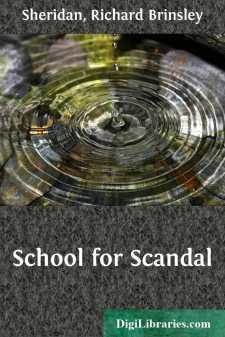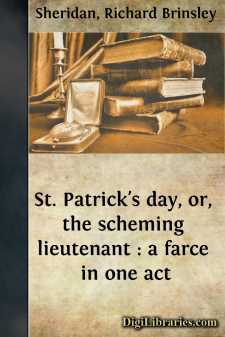Categories
- Antiques & Collectibles 13
- Architecture 36
- Art 48
- Bibles 22
- Biography & Autobiography 813
- Body, Mind & Spirit 142
- Business & Economics 28
- Children's Books 13
- Children's Fiction 10
- Computers 4
- Cooking 94
- Crafts & Hobbies 4
- Drama 346
- Education 46
- Family & Relationships 57
- Fiction 11828
- Games 19
- Gardening 17
- Health & Fitness 34
- History 1377
- House & Home 1
- Humor 147
- Juvenile Fiction 1873
- Juvenile Nonfiction 202
- Language Arts & Disciplines 88
- Law 16
- Literary Collections 686
- Literary Criticism 179
- Mathematics 13
- Medical 41
- Music 40
- Nature 179
- Non-Classifiable 1768
- Performing Arts 7
- Periodicals 1453
- Philosophy 64
- Photography 2
- Poetry 896
- Political Science 203
- Psychology 42
- Reference 154
- Religion 513
- Science 126
- Self-Help 84
- Social Science 81
- Sports & Recreation 34
- Study Aids 3
- Technology & Engineering 59
- Transportation 23
- Travel 463
- True Crime 29
Richard Brinsley Sheridan
Richard Brinsley Sheridan (1751–1816) was an Irish playwright and politician renowned for his witty comedies and influential work in the British theatre. His most famous plays include "The Rivals" (1775) and "The School for Scandal" (1777), both of which are celebrated for their sharp satire and clever dialogue. In addition to his success in the theatre, Sheridan served as a Member of Parliament for many years, where he was known for his eloquent speeches and support of the Whig party. He also managed the Drury Lane Theatre, one of London's leading theatres, contributing significantly to the cultural life of the era.
Author's Books:
Sort by:
PREFACE A preface to a play seems generally to be considered as a kind of closet-prologue, in which—if his piece has been successful—the author solicits that indulgence from the reader which he had before experienced from the audience: but as the scope and immediate object of a play is to please a mixed assembly in representation (whose judgment in the theatre at least is decisive,) its degree of...
more...
SCENE I.—The Library Enter SURFACE and SERVANT SURFACE. Mr. Stanley! and why should you think I would see him?— you must know he came to ask something! SERVANT. Sir—I shouldn't have let him in but that Mr. Rowley came to the Door with him. SURFACE. Pshaw!—Blockhead to suppose that I should now be in a Temper to receive visits from poor Relations!—well why don't you show the Fellow...
more...
ACT I. SCENE I.—LIEUTENANT O'CONNOR's Lodgings. Enter SERJEANT TROUNCE, CORPORAL FLINT, and four SOLDIERS. 1 Sol. I say you are wrong; we should all speak together, each for himself, and all at once, that we may be heard the better. 2 Sol. Right, Jack, we'll argue in platoons. 3 Sol. Ay, ay, let him have our grievances in a volley, and if we be to have a spokesman, there's the...
more...
ACT I. SCENE I.—The Hall of an Inn. Enter TOM FASHION and LORY, POSTILION following with a portmanteau. Fash. Lory, pay the postboy, and take the portmanteau. Lory. [Aside to TOM FASHION.] Faith, sir, we had better let the postboy take the portmanteau and pay himself. Fash. [Aside to LORY.] Why, sure, there's something left in it! Lory. Not a rag, upon my honour, sir! We eat the last of your...
more...
ACT I. SCENE I.—The Street before DON JEROME'S House. Enter LOPEZ, with a dark lantern. Lop. Past three o'clock!—Soh! a notable hour for one of my regular disposition, to be strolling like a bravo through the streets of Seville! Well, of all services, to serve a young lover is the hardest.—Not that I am an enemy to love; but my love and my master's differ strangely.—Don Ferdinand...
more...






